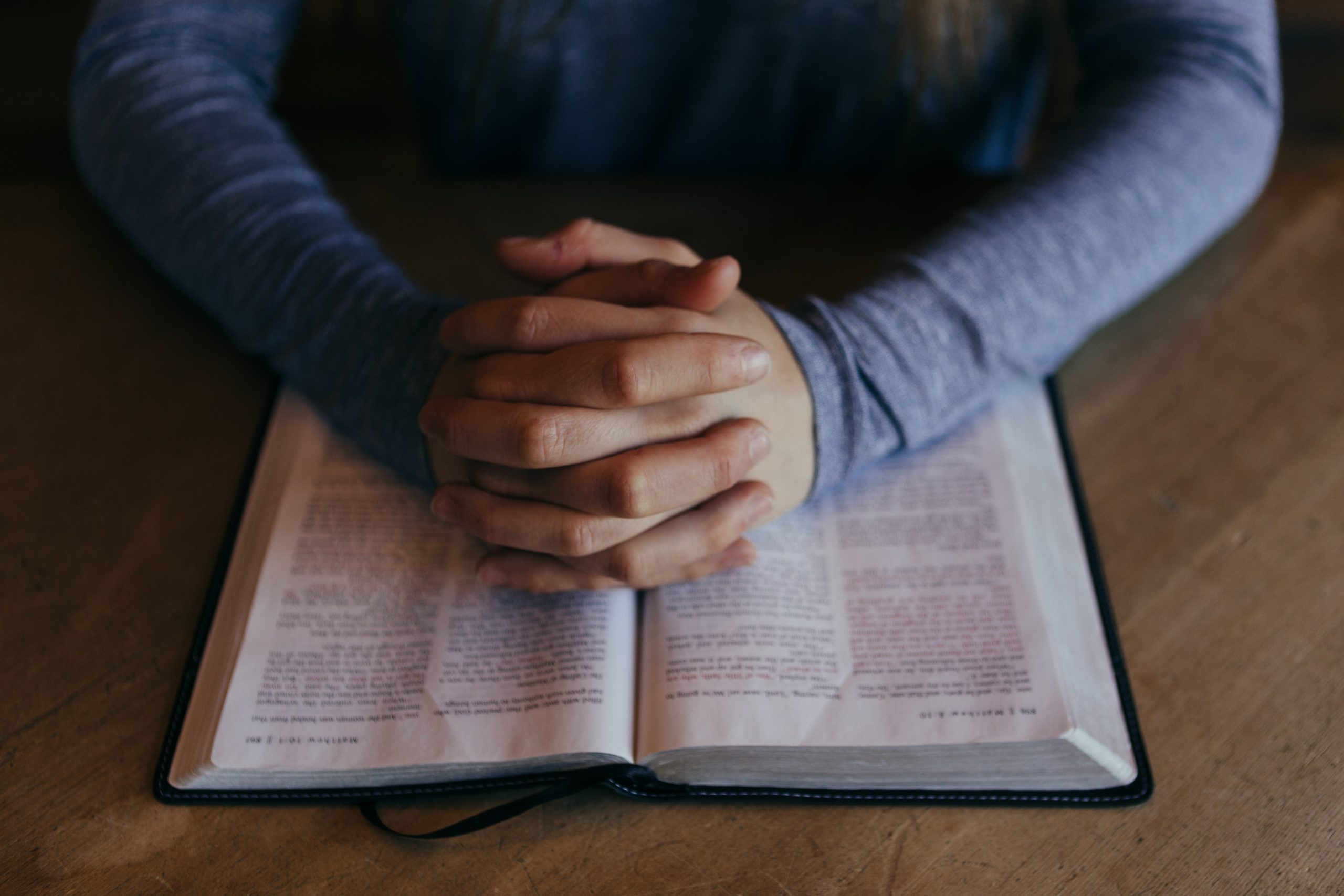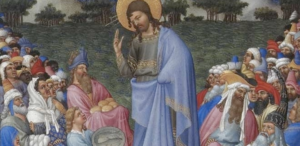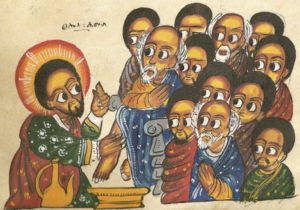In the Throes of John 6
Co-missioners,
This week we send along a homily by our favorite Lutheran in Episcopal clothing, Steve Kuhl. He delivered it in Milwaukee a few days ago, on the third of five successive Sundays that feature a piece of John 6 as the Gospel for the day. Most of the active preachers among you are likely puzzling over what to do with the John 6 segment appointed for next Sunday. Really, how do you a feed a congregation whose eyes will glaze when they hear yet again about the Bread of Life? Perhaps you’ll find some help for your own work in Steve’s work last Sunday. As for the rest of us, there is Gospel here of which we can never get enough. Let this be sufficient reason for taking time to read it.
A reminder while we’re at it of the announcement we sent last week. Drs. Mary Shore and Kit Kleinhans, both ELCA seminary deans, will be joined by Pr. Robin Lütjohann as featured speakers at a two-day Crossings seminar next January. The topic: “The Promising Community.” The dates: January 23-25, 2022. The location: Our Lady of the Snows, Belleville, Illinois. These plans were laid amid the optimism of last month. The sudden surge of COVID’s Delta variant, we’re assuming for now that the vaccinated will still be able to gather safely five months from now. Stay tuned.
Peace and Joy,
The Crossings Community
“Taught By God”. A Homily on John 6:35, 41-51
by Steven Kuhl, Rector

St Mark Episcopal Church, South Milwaukee
The Gospel reading for today continues what is often called Jesus’ “Bread of Life” discourse, a grand metaphor aimed to help us understand who Jesus is and why we need him.
Jesus had earlier fed 5000 people with five loaves and two fish. Of all the miracles that Jesus did, they seemed to like that one the best. Here was a guy, they thought, who could put them on “easy street.” Of course, Jesus saw through them and their opportunistic thinking. Jesus didn’t come to make life in this world easy. He came to change them, from thinking only about themselves to thinking about others. They had totally twisted Jesus’ meaning when he fed the 5000. Today, that twisting takes the form of what is variously called “the prosperity gospel” or the “health and wealth gospel.” It is what many of the TV evangelists preach, and it is generally self-serving. For they use their wealth as proof of their message to get more wealth from those who will follow them. Excuse me for being so blunt about their motives. But it seems warranted in light of how blunt Jesus was when he saw that disposition in the crowd.
Episcopalians, along with other mainline Reformation traditions, have a different view of the gospel. It is not about “health and wealth” but “repent and believe in the forgiveness of sins.” And, although we as Episcopalians can get off track on this “true gospel,” we have instituted a great reminder of what that true gospel is. We call it the “Book of Common Prayer.” Notice how our liturgy constantly calls us to repent and believe in the forgiveness of sins. It permeates every part of the liturgy, from the “Penitential Order” to the “Holy Eucharist.” True, we can let that gospel roll off our backs like water off a duck. We can ignore it and not take it to heart. We can live—and too often do—lives that don’t reflect what we say with our lips or read in our books. But we cannot say we haven’t been told what the true gospel is. It is there, in the Book of Common Prayer, in black and white.
 In the gospel reading for today, Jesus had just told the crowd that they have missed the point about the meaning of the feeding of the five thousand and are missing out on the “true bread” he has come to give: “The bread that endures unto eternal life.” Of course, Jesus is speaking metaphorically when he compares himself to bread, when he says, “I am the bread of life.” The metaphor works like this. Just as we make the right use and get the benefits of bread by eating it, so we make the right use and get the benefits of Christ by believing or trusting in him. That is, trusting that because of him we are forgiven by God and that we will have eternal life, life with God forever: Father, Son and Holy Spirit.
In the gospel reading for today, Jesus had just told the crowd that they have missed the point about the meaning of the feeding of the five thousand and are missing out on the “true bread” he has come to give: “The bread that endures unto eternal life.” Of course, Jesus is speaking metaphorically when he compares himself to bread, when he says, “I am the bread of life.” The metaphor works like this. Just as we make the right use and get the benefits of bread by eating it, so we make the right use and get the benefits of Christ by believing or trusting in him. That is, trusting that because of him we are forgiven by God and that we will have eternal life, life with God forever: Father, Son and Holy Spirit.
Why is that important? Because the reason we die is not ultimately because we lack physical bread. Just look at how many people who have more bread—more material goods—than they know what to do with. They all die! True, people who are deprived of bread, the poor, do die because of that lack. But they die, not only because they lack bread, but because the world, those with bread, lack generosity. The existence of starvation is a sign of the world’s, of our, sin. This is what Jesus meant when he said “the poor you will always have with you” (John 12:8). They are with us as a sign of our sin. But as he goes on to say, “you will not always have me with you” (12:8), he who is the sign, the giver, of God’s forgiveness. So, he says, make use of me, too, when I come to you. And that’s precisely what we do when we gather as church to hear his word and then are dispersed in faith to love and serve the Lord, to live repentantly and lovingly in our daily activity.
But, of course, in the text for today the crowd did not “gladly hear the word of Christ and use it.” They complained and grumbled mightily about Jesus. They wanted their cake (the daily bread that God gives to sustain temporal life) and eat it too (hoard it for themselves and not share it with those in need). They, of course, try to justify their objection to Jesus by throwing up all kinds of “academic” questions. Jesus said that “he has come down from heaven,” from God, his Father, precisely to give them the bread/word of life. But they objected. They know Jesus’ earthly parents, they say, and they refuse to believe that he can be both the Son of God and the Son of Mary, the Word made flesh (1:14).
 This objection leads Jesus to explain how faith is possible. With sinners it is impossible. They cannot believe in Jesus by their own reason or strength. Why? Because their reason and strength is twisted or, as Augustine put it, they are turned in on themselves and away from God. That, after all, is the nature of sin. Sinners are those who insist on living by their will and not God’s will (cf. 1:13), they are by nature self-centered and not God-centered. Therefore, only the Father can untwist us, only the Father can draw us away from self-centered captivity and to Christ-centered freedom (cf. 8:34-36), to faith in him whom the Father sent to save us. In the text, Jesus, by referencing “the prophets” (Isaiah 54:13 and Jeremiah 31:34), also describes this change of focus away from self to God as being “taught by God” (v. 45).
This objection leads Jesus to explain how faith is possible. With sinners it is impossible. They cannot believe in Jesus by their own reason or strength. Why? Because their reason and strength is twisted or, as Augustine put it, they are turned in on themselves and away from God. That, after all, is the nature of sin. Sinners are those who insist on living by their will and not God’s will (cf. 1:13), they are by nature self-centered and not God-centered. Therefore, only the Father can untwist us, only the Father can draw us away from self-centered captivity and to Christ-centered freedom (cf. 8:34-36), to faith in him whom the Father sent to save us. In the text, Jesus, by referencing “the prophets” (Isaiah 54:13 and Jeremiah 31:34), also describes this change of focus away from self to God as being “taught by God” (v. 45).
One other “academic” objection arises indirectly in the text. Don’t people who believe in Jesus die? Of course they do, says Jesus. But there is a profound difference between dying in your sin and dying in faith in Christ and the forgiveness of sins. Concerning the latter, says Jesus, “I will raise them up on the last day” (v. 40) and, therefore, because of me, they “will live forever” (v. 51). Their death is simply the last thing about them that needs changing. They need to be rid of the body of sin and death so as to receive the body of righteousness and eternal life in the resurrection. Still, before that day comes, already in this dying, sinful body, various benefits of Christ are already being enjoyed by believers (it’s called the “knowledge of forgiveness”) and shared with the world (it’s called “loving one another as Christ loves them”).
It is our sinful nature not only to complain about the suffering we must endure, but to complain also about the solution when it comes, even to the point of rejecting it. I can’t help but relate this to what’s happening with the vaccine. Therefore, let us pray that, by the power of the Holy Spirit, we may be “taught by God” to believe in him whom the Father has sent “for the life of the world” (v. 51). And let us not balk when he says that “the bread that he gives for the life of the world is his flesh” (v. 51). For we have beheld the glory of his flesh when he gave it for the life of the world in his death and resurrection; and we partake of his glorious flesh every time we receive “the body of Christ, the bread from heaven” in the Eucharist, the bread that truly calls forth thanksgiving.